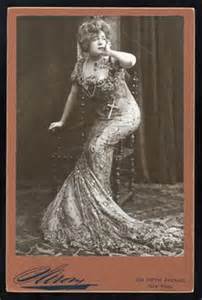Enter to win a copy of the book
Entertaining Women:
Actresses, Dancers, and Singers in the Old West
My life has run in strange places. My years have been full of color. I have known the heights of success, but likewise I have known the depths of despair.”
Leslie Carter, Liberty magazine, 1927
Catherine Louise Dudley Carter sat at her desk and clutched a pen in her hand. Nothing was left of her life but the raw will to do the only quasi respectable thing open to a woman in her circumstances. She had lost the wealthy position and standing in society that she had taken for granted for so long. She’d been kicked out of her palatial home. She had failed in her divorce case and in obtaining the money to maintain her lifestyle; her nine-year-old son had been ripped from her arms, and her once good name had been scandalously linked to actor Kyrle Bellew and New York Senator James F. Pierce.
The scandal didn’t bother her too much—small-minded persons, including her husband, just did not understand. “There is great romance, there is great love, there is great passion—all things difficult to guide—and some men and women reserve the right to have these things, regardless of that sharp dividing line which makes it legal,” she later wrote, dramatically justifying her choices.
Unfortunately, she’d fallen to the wrong side of that sharp legal and moral dividing line and now knew the cost. Her husband, wealthy industrialist Leslie Carter, had won everything in what the New York Times, in June 1889, called the “most indecent and revolting divorce trial ever heard in the Chicago courts.” Louise Carter considered herself virtually penniless, her reputation shredded to ribbons by the press, while her husband gloated over winning his countersuit charging her with adultery.
She shuddered at the memory of the witnesses against her, a veritable parade of chambermaids, housekeepers, hotel guests, and other traitors her husband had somehow coerced into telling the most awful tales about her. He had taken everything from her. She decided to take the one thing he’d given her that could most embarrass him: his name.
The plan she conceived to become an actress did not stop short of stardom. Her name—no, his name—would be blazoned in lights for all to see. She would, forevermore, be known as Mrs. Leslie Carter. That, she thought, would make her husband’s impassive face show some expression. “Nothing ever happened to Leslie Carter; consequently, nothing ever happened to his face,” she recalled. The day would come she vowed, when the name she hated would be on marquee lights and his humiliation would be as great as hers was now.
Dreaming of revenge would not make it happen. Images of poverty and squalor rose in her mind. Somehow she must triumph over this ugly trick of fate that her husband and a jury had played. The theater offered the only way out, with the added attraction of mortifying her ex-husband. Shrugging away the fact that her first attempt at becoming an actress had been unsuccessful, she concocted a new plan to succeed.
Dipping her pen into a small bottle of ink, she wrote to a man who had promised to help. The plea Louise Carter sent to wealthy meatpacker Nathaniel K. Fairbank resulted in an offer to assist her to become an actress, and his influence secured an appointment with New York theatrical manager E. G. Gilmore, who agreed to handle her career.
To learn more about Leslie Carter and about the other talented performers of the
Old West read
Entertaining Women: Actresses, Dancers, and Singers in the Old West.


